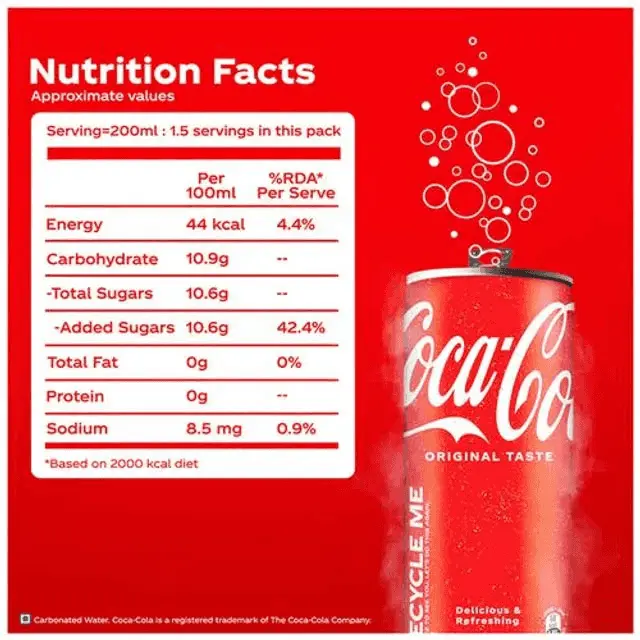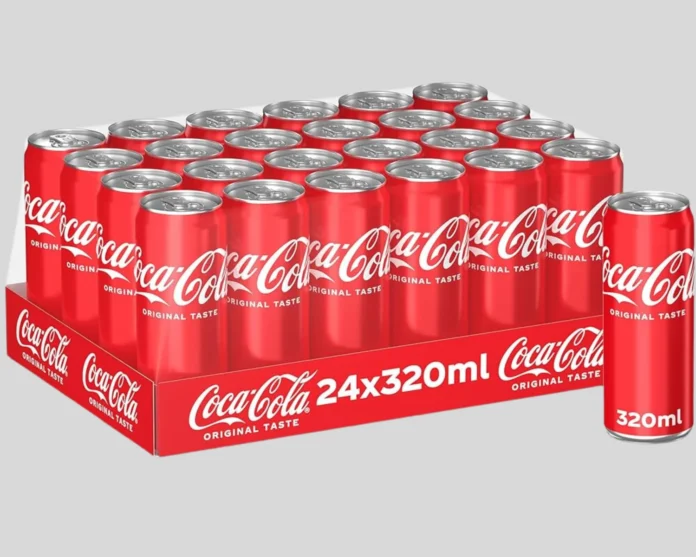Introduction
Hope you have heard of the sugar in a can of Coke—did you know it contains around 39 grams, which is roughly 10 teaspoons of sugar? Sugary drinks have long been a staple of modern diets, but have you ever wondered just how much sugar is in a can of Coke? With growing concerns about health risks associated with excessive sugar consumption, governments worldwide are implementing stricter regulations on sugary beverages.
In this guide, we’ll break down the sugar content in Coca-Cola, compare it to other popular fizzy drinks, discuss the latest UK sugar tax changes, and highlight the health risks linked to high sugar intake.
Sugar in a Can of Coke
A standard 330ml can of Coca-Cola in the UK contains 35 grams of sugar, which is equivalent to approximately 9 teaspoons. In the United States, a 12-ounce (355ml) can contains 39 grams of sugar, slightly more than the UK version.
For comparison, here’s how Coke stacks up against other fizzy drinks:
• Dr Pepper – 14g of sugar per 330ml
• Fanta – 15g of sugar per 330ml
• Irn-Bru (reformulated in 2018 to lower sugar content) – 15g of sugar per 330ml
A single can of Coca-Cola exceeds the NHS’s daily recommended limit of 30 grams of free sugars for adults. This makes it a major contributor to excessive sugar consumption and related health issues.
UK Sugar Tax and 2025 Changes

The UK government introduced the Soft Drinks Industry Levy (SDIL) in 2016 to reduce sugar intake, particularly among children. This levy applies to sugary drinks containing more than 5g of sugar per 100ml. The tax is divided into two tiers:
• £0.18 per litre for drinks with 5–8g of sugar per 100ml
• £0.24 per litre for drinks with 8g or more per 100ml
Upcoming Changes in 2025
Starting April 1, 2025, the sugar tax rates will increase:
• Lower rate: From 18p per litre to £1.94 per 10 litres (~19p per litre)
• Higher rate: From 24p per litre to £2.59 per 10 litres (~26p per litre)
These increases are expected to make sugary drinks more expensive and encourage manufacturers to reduce sugar content further.
Health Risks of High Sugar Consumption
Consuming excessive sugar has been linked to several health problems. According to the NHS, here are some major risks:
- Weight Gain and Obesity
Sugary drinks are high in empty calories, contributing to weight gain and obesity. Unlike solid foods, liquid sugars don’t promote fullness, leading to increased calorie consumption. - Type 2 Diabetes
High sugar intake is a major risk factor for insulin resistance, which can lead to type 2 diabetes. - Heart Disease
Studies have found that excessive sugar consumption increases the risk of heart disease by contributing to obesity, inflammation, and high blood pressure. - Dental Decay
Sugary drinks are one of the leading causes of tooth decay, as sugar feeds harmful bacteria that erode enamel. - Increased Cancer Risk
Some studies suggest that high sugar consumption may be linked to an increased risk of certain cancers, though research is ongoing.
Are Sugar-Free Alternatives Safer?
Many fizzy drinks now come in sugar-free or diet versions using artificial sweeteners like aspartame or sucralose. While these alternatives help reduce sugar intake, studies suggest they may have their own health risks, including:
• Potential metabolic effects that may still contribute to weight gain.
• Disrupting gut microbiota, which can impact digestion and immune function.
• Increased cravings for sweet foods, leading to higher calorie intake.
Despite these concerns, the NHS still recommends sugar-free drinks over full-sugar options when consumed in moderation.
Conclusion
A can of Coca-Cola contains 35 grams of sugar in the UK and 39 grams in the US, far exceeding recommended daily limits. With upcoming increases in the UK sugar tax, sugary drinks are set to become more expensive, pushing consumers toward healthier alternatives.
While sugar-free options exist, they also come with potential risks. The best approach is to limit the consumption of all fizzy drinks and opt for healthier beverages like water, herbal teas, or naturally flavored drinks.



Eye-opening and shocking! It’s time we rethink our daily sugar intake and its impact on health.